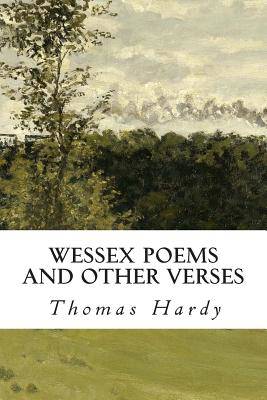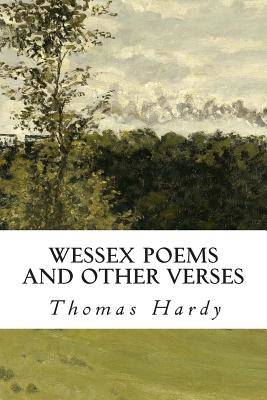
Door een staking bij bpost kan je online bestelling op dit moment iets langer onderweg zijn dan voorzien. Dringend iets nodig? Onze winkels ontvangen jou met open armen!
- Afhalen na 1 uur in een winkel met voorraad
- Gratis thuislevering in België vanaf € 30
- Ruim aanbod met 7 miljoen producten
Door een staking bij bpost kan je online bestelling op dit moment iets langer onderweg zijn dan voorzien. Dringend iets nodig? Onze winkels ontvangen jou met open armen!
- Afhalen na 1 uur in een winkel met voorraad
- Gratis thuislevering in België vanaf € 30
- Ruim aanbod met 7 miljoen producten
Zoeken
Omschrijving
Wessex Poems and Other Verses is a collection of classic Thomas Hardy poetry that includes the following works: A Confession to a Friend in Trouble, Neutral Tones, and She and Her Initials.Thomas Hardy OM (2 June 1840 - 11 January 1928) was an English novelist and poet. A Victorian realist in the tradition of George Eliot, he was influenced both in his novels and in his poetry by Romanticism, especially William Wordsworth.[1] He was highly critical of much in Victorian society, especially on the declining status of rural people in Britain, such as those from his native South West England.While Hardy wrote poetry throughout his life and regarded himself primarily as a poet, his first collection was not published until 1898. Initially, therefore, he gained fame as the author of such novels as Far from the Madding Crowd (1874), The Mayor of Casterbridge(1886), Tess of the d'Urbervilles (1891), and Jude the Obscure (1895). During his lifetime, Hardy's poetry was acclaimed by younger poets (particularly the Georgians) who viewed him as a mentor. After his death his poems were lauded by Ezra Pound, W. H. Audenand Philip Larkin. Many of his novels concern tragic characters struggling against their passions and social circumstances, and they are often set in the semi-fictional region of Wessex; initially based on the medieval Anglo-Saxon kingdom, Hardy's Wessex eventually came to include the counties of Dorset, Wiltshire, Somerset, Devon, Hampshire and much of Berkshire, in southwest and south central England. Two of his novels, Tess of the d'Urbervilles and Far from the Madding Crowd, were listed in the top 50 on the BBC's survey The Big Read. Thomas Hardy was born on 2 June 1840 in Higher Bockhampton (then Upper Bockhampton), a hamlet in the parish of Stinsford to the east of Dorchester in Dorset, England, where his father Thomas (1811-1892) worked as a stonemason and local builder, and married his mother Jemima (née Hand;[4] 1813-1904) in Beaminster, towards the end of 1839.[5] Jemima was well-read, and she educated Thomas until he went to his first school at Bockhampton at the age of eight. For several years he attended Mr. Last's Academy for Young Gentlemen in Dorchester, where he learned Latin and demonstrated academic potential.[6] Because Hardy's family lacked the means for a university education, his formal education ended at the age of sixteen, when he became apprenticed to James Hicks, a local architect. Hardy trained as an architect in Dorchester before moving to London in 1862; there he enrolled as a student at King's College London. He won prizes from the Royal Institute of British Architects and the Architectural Association. He joined Arthur Blomfield's practice as assistant architect in April 1862 and worked with Blomfield on All Saints' parish church in Windsor, Berkshire in 1862-64. A reredos, possibly designed by Hardy, was discovered behind panelling at All Saints' in August 2016.[8][9] In the mid-1860s, Hardy was in charge of the excavation of part of the graveyard of St Pancras Old Church prior to its destruction when the Midland Railway was extended to a new terminus at St Pancras Hardy never felt at home in London, because he was acutely conscious of class divisions and his social inferiority. During this time he became interested in social reform and the works of John Stuart Mill. He was also introduced by his Dorset friend Horace Moule to the works of Charles Fourier and Auguste Comte. After five years, concerned about his health, he returned to Dorset, settling in Weymouth, and decided to dedicate himself to writing.
Specificaties
Betrokkenen
- Auteur(s):
- Uitgeverij:
Inhoud
- Aantal bladzijden:
- 144
- Taal:
- Engels
Eigenschappen
- Productcode (EAN):
- 9781502411853
- Verschijningsdatum:
- 18/09/2014
- Uitvoering:
- Paperback
- Formaat:
- Trade paperback (VS)
- Afmetingen:
- 152 mm x 229 mm
- Gewicht:
- 199 g

Alleen bij Standaard Boekhandel
+ 24 punten op je klantenkaart van Standaard Boekhandel
Beoordelingen
We publiceren alleen reviews die voldoen aan de voorwaarden voor reviews. Bekijk onze voorwaarden voor reviews.











